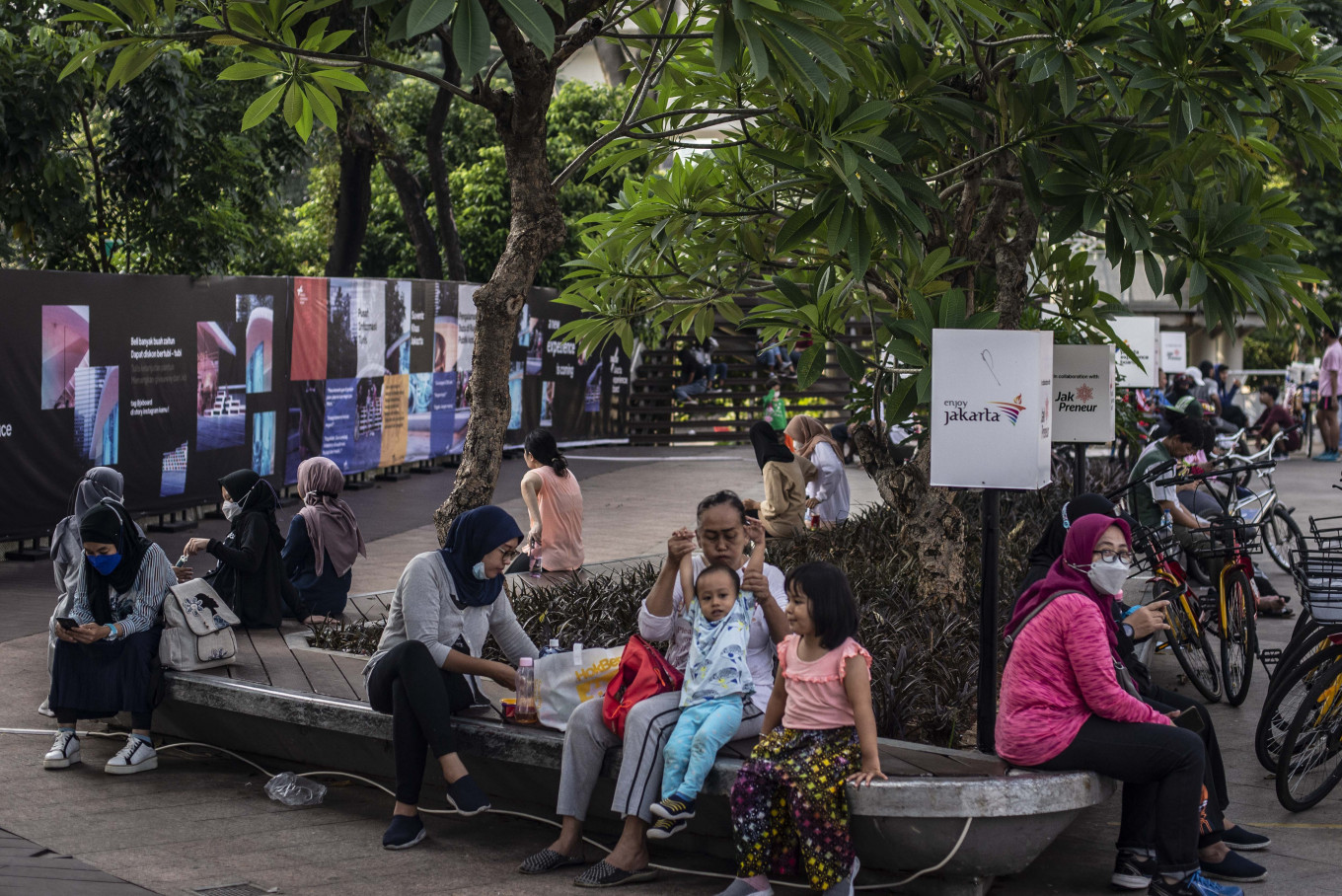Popular Reads
Top Results
Can't find what you're looking for?
View all search resultsPopular Reads
Top Results
Can't find what you're looking for?
View all search resultsPPKM system stays as restrictions loosen
Government continues to ease pandemic curbs with more cities and regencies now under the lowest level of PPKM.
Change text size
Gift Premium Articles
to Anyone
W
hile maintaining the four-tiered public activity restriction (PPKM) system, the government has continued to ease pandemic curbs with more cities and regencies now under the lowest level of PPKM.
In a Home Ministry Instruction published on Monday, the government has dropped COVID-19 restrictions for the Greater Jakarta area, from the previous level 2 PPKM curbs for the past two weeks, down to level 1 PPKM curbs for at least until June 6.
Jakarta is joined by 33 other cities and regencies across Java and Bali in dropping to the most lenient set of curbs, as the country’s COVID-19 indicators have yet to see a major spike in cases, despite the high public mobility, following the Idul Fitri holidays earlier this month.
Read also: Govt to ease more curbs after Lebaran policy ‘success’
Under the PPKM level 1 arrangement, office buildings across all sectors are now allowed to operate at full capacity, an increase from the previous 75 percent cap for offices in nonessential sectors.
Hotels, shopping centers, restaurants, cinemas, supermarkets and traditional markets can also now open at full capacity. The same also applies to houses of worship, public parks and public facilities as well as wedding receptions.
The easing of restrictions has come amid the country’s encouraging pandemic indicators. Indonesia reported just 345 new COVID-19 cases on Tuesday, compared with the country’s Omicron peak of 64,000 cases on Feb. 16. Tuesday’s daily caseload has also continued the country’s trend of reporting less than 500 cases for nearly the past six weeks.
Active cases, meanwhile, have slumped to a two-year low, at just under 3,000 cases on Tuesday. The last time the country reported similar numbers was on April 10, 2020.
Steps to go
While encouraging pandemic signs have led to some hoping that the government will drop its PPKM system, Deputy Health Minister Dante Saksono Harbuwono said the country would not revoke the system just yet, since Indonesia has yet to reach a stage of endemicity.
“Before reaching endemicity, there are still stages to go. From a pandemic, the [second stage] is deceleration, [followed by] a controlled pandemic, elimination and eradication,” Dante said during a meeting with lawmakers on Monday. “Right now, we are just about at [the stage] of a controlled pandemic.”
Dante said that the country’s target was to now maintain its confirmed cases, active cases and deaths at less than 20, five and one, respectively, per 100,000 people per week, while also maintaining the national virus reproduction rate (Rt) at less than one, for the next six months.
"What is important is that the easing of public restrictions is done step-by-step and is carried out periodically,” Dante said, adding that should cases continue to remain low, the PPKM system might be evaluated on a monthly basis, as opposed to the current bi-weekly arrangement.
The official said that almost all provinces across the archipelago had met the endemic criteria except for the 70 percent vaccination rate.
As of Monday, only seven out of Indonesia's 34 provinces had fully vaccinated more than 70 percent of their targeted residents and their elderly population.
"We need to remember that thus far, the World Health Organization still deems COVID-19 as a public health emergency of international concern and there's no country in the world that has declared COVID-19 as an endemic disease yet," Dante said.
Gusti Ngurah Mahardika, a virologist at Udayana University in Bali, agrees. "We need to wait at least three months, even six months to one year ideally, to be able to safely conclude that we have reached endemicity," he told The Jakarta Post on Tuesday.
Epidemiologist Riris Andono Ahmad from Gadjah Mada University said it would be difficult for Indonesia to reach and maintain COVID-19 endemicity when there were still many countries in the world that were seeing a surge of COVID-19 infections, such as the United States, North Korea and China.
"Exponential surge of infections could increase the risk of COVID-19 virus mutations, which could create more contagious or deadly virus variants. Those variants could change the path of the pandemic," Riris explained.
"Ideally, for COVID-19 to become endemic or to be completely eradicated, infections should remain low in all parts of the world and there should be no countries with low vaccination coverage, so the virus will run out of hosts to infect," he added.










